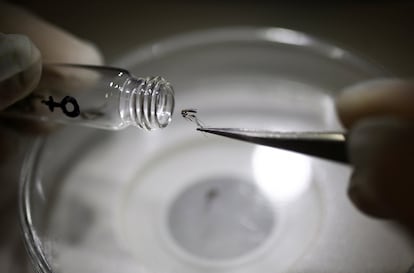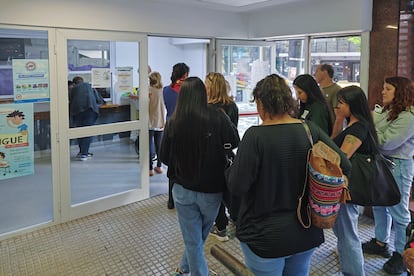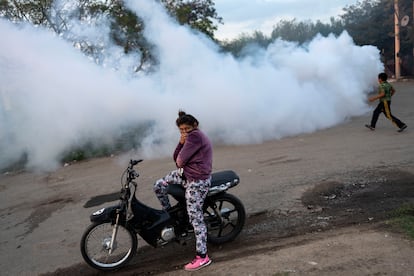A vaccine against dengue in times of crisis: How, where and when?
The drug Qdenga, which has begun to be distributed massively in Brazil, could be a useful tool against a disease on the rise in Latin America

In 2024, Buenos Aires registered a dengue fever-related death for the first time in four years. It came during one of the worst outbreaks the country has experienced, with more than 232,900 recorded cases and 161 victims, but it is also a warning sign of what happens when temperatures rise, driven by climate change. There are more and more regions where the mosquito that transmits the virus, Aedes aegypti, feels comfortable. It is expected that the Argentine capital — normally immune to the dengue outbreaks that tend to afflict the more tropical northern regions of the country — will soon be rescued by the drop in temperatures coinciding with the fall. In fact, the number of cases in Buenos Aires is already decreasing. However, this does not apply to the rest of the Latin American region.
According to the latest bulletin of the Pan American Health Organization (PAHO), published on April 19, during the first three months of 2024 more than 4.2 million suspected cases of dengue fever were recorded, four times more than in the same period in 2023 and almost six times more when compared to the average over the last five years. Argentina, Peru, Colombia, Mexico, and especially Brazil — with 86% of infections over the past week — are the most affected countries.
Now, it is Brazil that is in the spotlight. The government decided to pilot a mass inoculation plan using the Qdenga vaccine, manufactured by the Japanese pharmaceutical company Takeda, among three million Brazilians. The Lancet recently published data on the effectiveness of this vaccine — the second that has been produced against dengue — in some 20,000 people over four years after they received the injection: protection stood at 61.2% against dengue infection and 84.1% against hospitalization due to the disease.
But, with Qdenga’s safety and efficacy corroborated, in addition to a pressing crisis in the region, why is only Brazil administering the vaccine to the population? To begin with, not all countries have approved it. Currently, in addition to Brazil, the vaccine has been green-lighted in Colombia and Argentina, but not in Mexico and Peru. However, approval by the regulatory authorities is no guarantee that the vaccine will be accessible or distributed on a large scale. In fact, it may not yet be advisable to do so in this case.

Daniel Salas, executive manager of PAHO’s Immunization Program, puts it bluntly: “The use of the vaccine is not a critical factor in managing the current epidemics.” One of PAHO’s recommendations for Qdenga vaccination strategies is that it be administered “one to two years before the age-specific peak incidence” of more dengue hospitalizations. That means that injections given now against current outbreaks would not serve to mitigate the crisis. “That is why we insist that the strategies to control the advance of dengue should focus on prevention and control of the transmitting mosquito, education of the population, and strengthening the capacity for clinical management, among other factors,” Salas adds.
Another concern that makes some people uneasy is the effects of the vaccine on the different types of dengue virus. There are four in circulation (DENV-1, DENV-2, DENV-3, and DENV-4), and the vaccine does not respond in the same way to all of them. “There is an unknown here,” acknowledges virologist Adrián Díaz, a researcher at Argentina’s National Scientific and Technical Research Council (Conicet). The latest Qdenga data show that the vaccine is effective for serotypes 3 and 4 only if the person has had a previous dengue infection. “What would happen if we start mass vaccination and we see that for dengue 3 and 4 it does not protect as much, taking into account the background of Sanofi’s vaccine?”
Díaz’s reference to Sanofi is a grim episode in dengue vaccine research: the French pharmaceutical company developed Dengvaxia, the first vaccine against the disease. The first large-scale application was performed in the Philippines between 2016 and 2017 and went on to vaccinate more than 800,000 minors before the program was scrapped when it was discovered that children who had been inoculated without having been previously infected could develop severe dengue upon first catching the disease. Years later, that campaign is estimated to have prevented more hospitalizations than it caused, but the damage was done and the ghost of that experience haunts Qdenga’s footsteps.
“Many of these answers will come from Brazil’s courageous decision to massively vaccinate,” Díaz reasons. In addition, the Argentine municipalities of Salta, Corrientes, and Misiones, all in dengue-endemic areas in the north of the country, bought the vaccine locally to administer it free of charge in three pilot schemes that will also serve to gather more information on how the drug performs in real life.

However, Eduardo López, a pediatric infectologist and epidemiologist who participated in the Qdenga clinical trials in Cali, Colombia, believes there should be greater urgency. “We hope that at some point [the vaccine] will be included in national strategies; we have to aim for that. The problem is serious, it’s not going to go away on its own and we have a tool that we should take advantage of.” While perhaps it is not the time to vaccinate indiscriminately, López believes there are steps that can already be taken. “First, from the regulatory point of view, how the different countries are going to approve it,” a step for which “there is sufficiently robust information,” according to the infectologist. “We also need more intense communication and community education” to raise awareness about the vaccine and generate confidence, adds the expert, in addition to collecting information on the areas with the highest seroprevalence — where more people have already been infected with dengue — so that those populations can be prioritized in future vaccination campaigns. “Efforts are already being made in different countries in this regard,” notes López.
In addition to patience, information, and outreach, there is another missing piece in the puzzle for the vaccine to become a useful tool against dengue crises: accessibility. For now, the six million doses that Takeda is capable of manufacturing have been purchased by Brazil for its public vaccination strategy, so large-scale production for the whole region is unfeasible if there are no agreements in place to produce it in other laboratories — something that is already being studied in Brazil. Additionally, there is the price tag: in Argentina, for example, the two doses that make up the vaccination scheme can be bought privately for about $150. In March 2023, Takeda announced that it expected to sell its doses for between $40 and $115, depending on the use of the vaccine and the geographical area where it is purchased.
These figures imply investments of millions of dollars for large-scale vaccination programs that not all Latin American countries can afford. One option to facilitate the distribution of the vaccine is the PAHO Revolving Fund, a strategy that seeks to reduce the price of the drugs through the mediation of the organization. Salas confirmed that “the Revolving Fund has the vaccine available, but in very limited quantities for 2024.″ As of the date of publication of this article, EL PAÍS had not received a response on how these doses will be prioritized, or what medium-term strategy PAHO is seeking. Eduardo López recalls that the unequal distribution of vaccines “was one of the errors that the pandemic brought to our attention. Dengue is a neglected tropical disease, because it primarily affects people or regions with more socioeconomic difficulties,” he notes, and as such “it is vital that there is equitable access” in Latin America.
Dengue transmission has increased by 35% in the last six decades and the future augurs that it will only accelerate, so any strategy is urgent. “Having a vaccine will not eliminate the virus or the mosquito [...] It is not the solution, but it is one more tool that will help us to reduce the impact of dengue on the health system,” says Díaz. And while the path of the drug continues to develop, he underlines other basic pillars to manage the crises that the region is experiencing. “Education, which is the most powerful thing,” both in communities and among health workers, and strategies to control the mosquito with insecticides and by eliminating its breeding sites. “These are tools that only require collective organization,” he concludes.
Sign up for our weekly newsletter to get more English-language news coverage from EL PAÍS USA Edition
Tu suscripción se está usando en otro dispositivo
¿Quieres añadir otro usuario a tu suscripción?
Si continúas leyendo en este dispositivo, no se podrá leer en el otro.
FlechaTu suscripción se está usando en otro dispositivo y solo puedes acceder a EL PAÍS desde un dispositivo a la vez.
Si quieres compartir tu cuenta, cambia tu suscripción a la modalidad Premium, así podrás añadir otro usuario. Cada uno accederá con su propia cuenta de email, lo que os permitirá personalizar vuestra experiencia en EL PAÍS.
¿Tienes una suscripción de empresa? Accede aquí para contratar más cuentas.
En el caso de no saber quién está usando tu cuenta, te recomendamos cambiar tu contraseña aquí.
Si decides continuar compartiendo tu cuenta, este mensaje se mostrará en tu dispositivo y en el de la otra persona que está usando tu cuenta de forma indefinida, afectando a tu experiencia de lectura. Puedes consultar aquí los términos y condiciones de la suscripción digital.








































